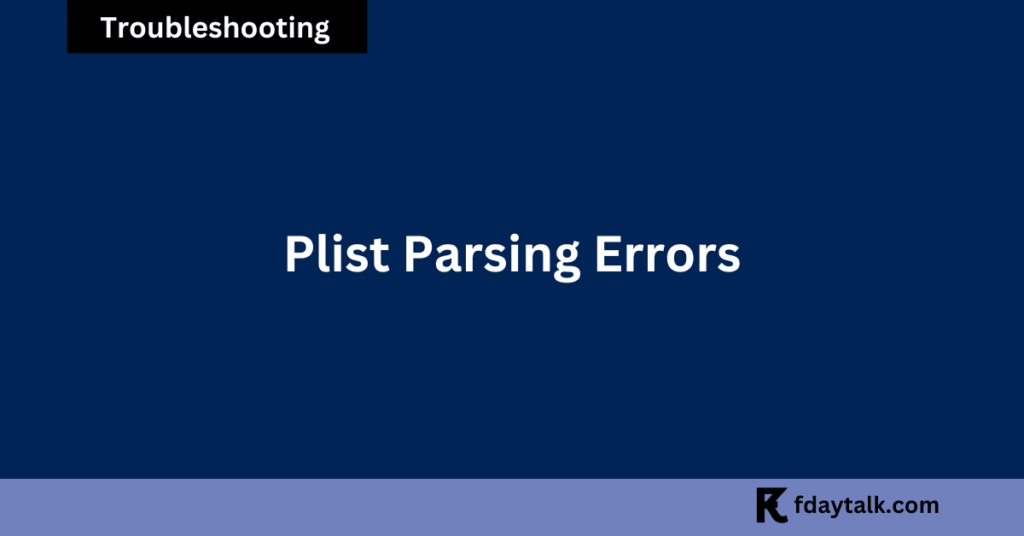Plist (Property List) files are an integral part of Apple’s macOS and iOS ecosystem, used to store configuration settings, application properties, and other structured data. However, developers often encounter plist parsing errors, which can be frustrating and time-consuming to resolve.

In this article, we’ll explore the common causes of plist parsing errors and step-by-step solutions to fix them effectively. We’ll also address real-world issues reported by developers, ensuring that you can tackle plist errors confidently.
What is a Plist Parsing Error?
A plist parsing error occurs when the system or an application cannot correctly read the property list file due to format inconsistencies, missing elements, or corruption. The typical error message might look like:
Couldn't parse contents of '/Users/.../Info.plist': The data couldn’t be read because it isn’t in the correct format.Or in Xcode:
error: Could not parse Info.plist fileCommon Causes of Plist Parsing Errors
1. Incorrect XML Formatting
Plist files in XML format must be well-structured. Errors occur if:
- Opening and closing tags do not match.
<dict>,<array>, or<string>elements are not properly enclosed.- There are missing quotation marks around string values.
- A key appears twice within a dictionary.
2. Corrupted Plist File
If a plist file has been truncated, altered by a faulty merge, or contains invalid characters, it may become unreadable.
3. Git Merge Conflicts
Developers using version control tools like Git may accidentally introduce conflicts in plist files, adding unwanted markers such as:
<<<<<<< HEAD
Key1
=======
Key2
>>>>>>> branch_name4. Invalid Data Types
Some applications expect specific data types (e.g., a string instead of an integer). An example error:
Serde("invalid type: integer `32924`, expected a string")5. Incorrect File Path in Xcode
If the plist file was moved or renamed without updating the reference in Xcode, the system might fail to locate it.
6. Preprocessor Issues in Xcode
Using the Xcode preprocessor with URLs in the plist file can cause parsing failures. Xcode may interpret // as a comment and omit the rest of the line.
How to Fix Plist Parsing Errors
1. Use plutil to Detect Errors
macOS provides a built-in tool, plutil, to validate plist files. Run the following command in the terminal:
plutil -lint /path/to/file.plistIf there’s an issue, plutil will display the error and the line number where the problem exists.
2. Open and Check the File in a Text Editor
If plutil detects errors, open the plist file in a text editor such as Sublime Text, VSCode, or Xcode’s source mode:
- Right-click the plist file in Xcode.
- Select Open As → Source Code.
- Look for syntax issues such as missing closing tags.
3. Resolve Git Merge Conflicts
If your plist file has Git conflict markers (<<<<<<<, =======, >>>>>>>), remove them manually and ensure the XML structure is intact.
4. Verify Data Types in Plist Values
If you encounter an error like:
Serde("invalid type: integer `32924`, expected a string")Check for misplaced integer values where a string is expected. Change:
<key>BuildNumber</key>
<integer>32924</integer>To:
<key>BuildNumber</key>
<string>32924</string>5. Check Xcode’s Build Settings for Plist File Path Issues
If your plist file was moved:
- Go to Build Settings.
- Search for Info.plist File.
- Update the correct path to reflect the new location.
For example, if the file moved to a Resources folder, update the path from:
TargetName/Info.plistto:
TargetName/Resources/Info.plist6. Fix Preprocessor Issues in Xcode
If Xcode is treating // as a comment inside URLs, either:
- Escape the
//using${}:
<key>UpdateURL</key>
<string>http:/${}/example.com/update</string>- Use the
-traditionalflag in the Other Preprocessor Flags section of Build Settings.
7. Delete Derived Data and Clean the Build
If none of the above methods work:
- Close Xcode.
- Delete Derived Data:
rm -rf ~/Library/Developer/Xcode/DerivedData- Open Xcode and perform a Clean Build (
Cmd + Shift + K).
Conclusion
Plist parsing errors in Xcode and macOS often stem from malformed XML, incorrect data types, or misplaced files. By using tools like plutil, manually inspecting the file, and adjusting Xcode settings, you can quickly resolve these errors and ensure your app runs smoothly.
If you’re still experiencing issues, consider sharing the problematic plist file (after redacting sensitive information) in developer forums or debugging with Xcode’s console logs.